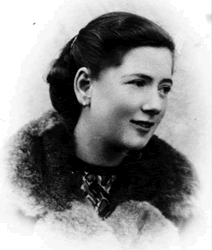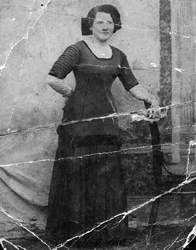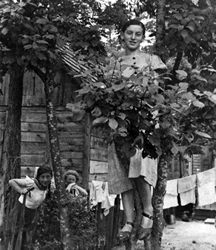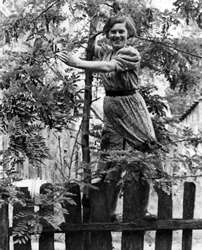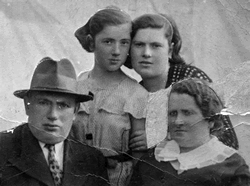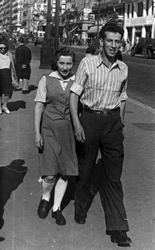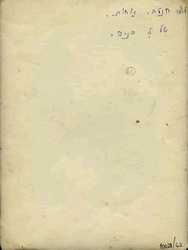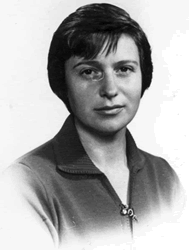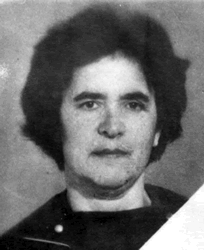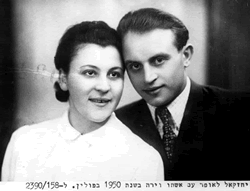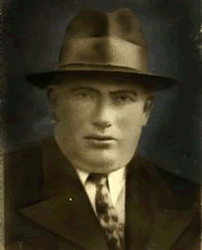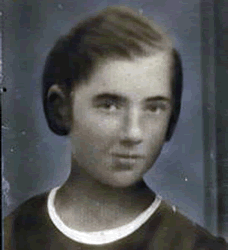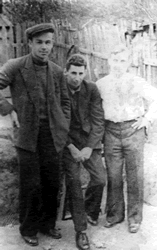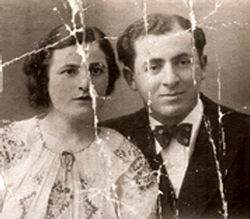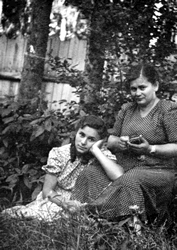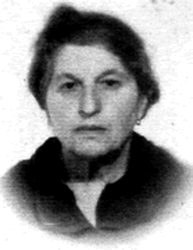#lfr-1:
Hana Laufer perished in the Shoah
#lfr-2:
Hadasa Laufer perished in the Shoah
#lfr-3:
Hana
#lfr-4
Henia nee Laufer
#lfr-5:
Henia Nee Laufer, with her sister Hana (perished), and parents.
#lfr-8:
Fania Laufer
#lfr-9:
Esther Laufer
#lfr-10:
Yechezkel and Vera Laufer
#lfr-11:
Meir Laufer perished in the holocaust
#lfr-12:
Hana Laufer perished in the holocaust
#lfr-13:
From left to right: Mayer, Moshe-Leib and Joseph Laufer.
My parents had seven children: three sons and four daughters. My oldest brother, Mayer, was born in 1913, Moshe-Leib in 1914, and Joseph, my youngest brother, in 1916. My brothers didn't go to cheder. My mother taught them to read and write. She taught us Yiddish and Hebrew. She also knew Polish and German. Her parents had hired a teacher for her when she was young. She learned a lot from her teachers and her parents, was very intelligent and a very good teacher.
My three brothers moved to Buenos Aires in 1932. My mother accepted their decision. She wanted her children to be happy and was hoping that they would have a better life in a different country. They borrowed some money from a farmer in our village, later they sent the amount to my mother and she gave it back to the farmer. They learned to drive a car and became drivers. They married Jewish girls and had children. We corresponded until 1940, but the contact stopped due to the war.
At the beginning of June 1941 my three brothers came to visit us. Their families stayed in Buenos Aires, because it was too expensive to take them on the trip. They brought us gifts: dresses, sweaters and cardigans. They brought a big flowered shawl for my mother and thin stockings and high-healed shoes for us. We had never seen anything like it before. My brothers had changed a lot since the time they left Kabaki. They were wearing suits and ties. They brought pictures of their wives and children. They had Jewish wives, but my brothers became very estranged from religion. They observed very few traditions and only went to the synagogue on holidays. They liked their new life and were planning to take us to Buenos Aires when they could.
On 22nd June 1941 the Great Patriotic War began. My brothers went to visit my sister Mariam and her husband in Zhabiye before the Germans approached Kabaki. Mariam and her husband invited them to celebrate Sabbath with them. We were expecting them back on Sunday afternoon. We woke up early to start making dinner when we heard shooting. Our Ukrainian neighbor, who respected my mother a lot, stormed into our house to tell her that the Germans were in the village and killing Jews. We hid in her hayloft and stayed there until the next morning. In the morning her husband came and told us that the Germans were killing families who gave shelter to Jews. We went home. The door to our house was open. We went in and saw my three brothers in blood on the floor. They had all been killed. My mother couldn't contact their families. We didn't even bury them.
My brothers photographed before their departure to Buenos Aires in 1932.
#lfr-14:
PHOTO TAKEN IN: Zhabiye
YEAR WHEN PHOTO WAS TAKEN:1938
COUNTRY NAME AT TIME OF PHOTO: USSR
My older sister Mariam and her husband David Shtein. She moved to her husband in Zhabiye after her wedding. My sister got photographed at our mother's request. My mother wanted to have her daughter's picture at home.
Mariam, named after my father's mother, was born in 1917. When my sisters grew up matchmakers began to come to our house. Once the father of a son came to my mother and asked for her consent to his son marrying Mariam. He was a Polish man from Rivno. He promised her to build a big house for the young couple in Kabaki. My mother refused and said that while she was alive her daughters would never marry anyone but Jewish men. She told him that she didn't want her daughters to hear things like, 'You damn zhydovka [kike], don't go to the synagogue, go to the Catholic church.' from their husbands. So, the man left.
Later a Jewish man from Zhabiye village in Kolomyya, not far from where we lived, proposed to Mariam. He had a house and kept sheep. He was two years older than Mariam. My mother and sister liked him. Mariam and her fiancé had a Jewish wedding with a chuppah in Kabaki. There weren't many guests at the wedding, just close relatives and friends. The rabbi said a prayer, the bride and bridegroom sipped wine from a wine glass, broke the glass and signed the ketubbah. There were tables laid in the yard of the synagogue for men and women. They danced and sang. When the party was over Mariam moved to her husband in Zhabiye village. Zhabiye was a Ukrainian village. There were farmers and cattle breeders in it. There were several Jewish families. It was only a small village so there was no synagogue, only a small prayer house.
People told us that the Germans killed my sister Mariam and her 11-month-old son in Zhabiye. A German soldier grabbed the baby and hit his head on a tree and shot my sister. She was 23. Her husband returned to the village a few days later and was shot, too. The Germans shot all the Jews in Zhabiye
#lfr-16:
AMALIA LAUFER
Chernovtsy , Ukraine
Amalia Laufer lives in an old Jewish neighborhood of Chernovtsy where the ghetto was located during the war. Her house is small and shabby. There is a small room and a kitchen that also serves as a dining room. There is a bed, a table, two chairs and a wardrobe. Amalia lives alone and has a cat. She usually does not communicate with strangers, so I was introduced to her by a volunteer from Hesed, who visits her. Amalia is a short thin woman with thick black hair. She has polyarthritis and hardly ever leaves her home. There is a candle stand on the table. She lights candles on Sabbath. She keeps her mother's prayer book open on the table. Her mother had this book with her when they came to the ghetto. During our conversation Amalia switches to Yiddish. She quotes the Torah and mentions biblical stories when recalling episodes from her life.
